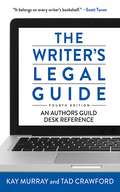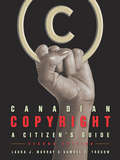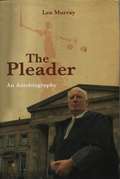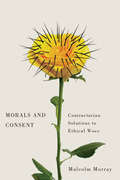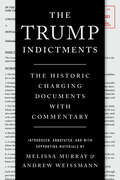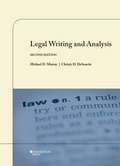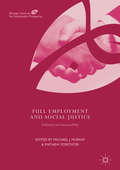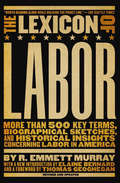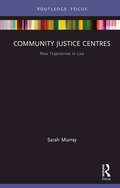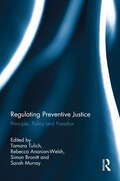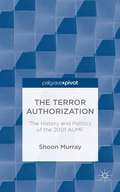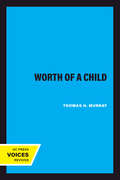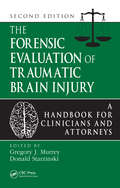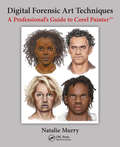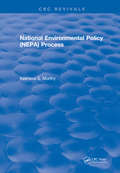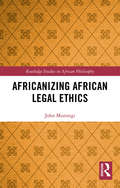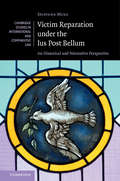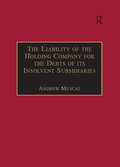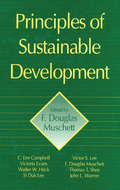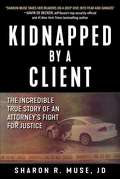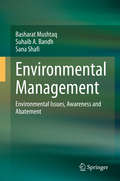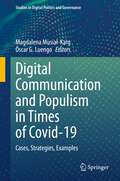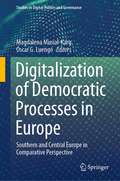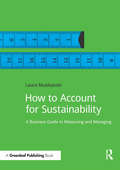- Table View
- List View
The Writer's Legal Guide, Fourth Edition: An Authors Guild Desk Reference
by Kay Murray Tad CrawfordIn an increasingly digitized and complex publishing world, writers need to know how to protect themselves against copyright infringement, legal trouble, and unwise concessions to publishers. Still the author's foremost advocate for copyright protection, fair contracts, and free expression, the Authors Guild has once again partnered with Allworth Press to update this invaluable reference. Thoroughly revised to reflect the many changes in the publishing industry, the fourth edition offers plain-English explanations of legal and business aspects of the trade, from electronic rights and ebooks to contracts and accounting. Other topics include: Registering copyrights, including onlineTaxes and bookkeepingFollowing fair use guidelinesNegotiating contracts with publishers and agentsObtaining permissions to use others' workDealing with periodical, syndication, film, television, play, and audio rights agreementsHandling business disputesUnderstanding libel, privacy, and the limits of free expressionAvoiding self-publishing misstepsPlanning authors' estates
Canadian Copyright: A Citizen’s Guide
by Laura J. Murray Samuel E. TrosowIn the age of easily downloadable culture, messages about copyright are ubiquitous. If you’re an artist, consumer, or teacher, copyright is likely a part of your everyday life. Completely updated, this revised edition of Canadian Copyright parses the Copyright Act and explains current Canadian copyright law to ordinary Canadians in accessible language, using recent examples and legal cases.
The Pleader: An Autobiography
by Len MurrayLen Murray, described by a High Court judge as the most respected pleader of his generation, practised as a solicitor in Glasgow for over 40 years. As part of a triumvirate of top lawyers based in the city during its period of renaissance, he built up one of the most respected law practices in the country. Among the benchmark cases with which Murray was involved was that of Tony Miller, one of the last people to be hanged in Scotland. Despite a desperate appeal by Murray, the 19-year-old was sent to his death on 22 December 1960. In his candid account Murray describes both the legal arguments and the personal effect the case had on him.Murray was also involved in bringing the Nazi war criminal Antanas Gecas to justice after his discovery in Edinburgh, he was the only solicitor ever to be retained by both Rangers and Celtic footballers who were accused of assaulting each other during a match at Ibrox, and he made a cheeky defence of famous Beatle Paul McCartney who was arrested on drugs charges. The Pleader recounts these and many more tales of the courts and the characters who inhabited them, whether they sat on the bench or stood in the dock. Reluctant to go public until now, Murray has always upheld the simple tenet that client confidentiality is paramount. His decision to publish his memoirs at this time reflects a feeling that he has a responsibility to new students of law and to old friends to put the record straight on many of the fascinating stories to come before the Scottish courts. From the simplest of violations to the most serious of capital crimes, he opens his amazing and hitherto secret files to the world.
Morals and Consent: Contractarian Solutions to Ethical Woes
by Malcolm MurrayHow are we meant to behave? And how are we to defend whatever answer we give? Morals and Consent grounds our notion of morality in natural evolution, and from that basis, Malcolm Murray shows why contractarianism is a far more viable moral theory than is widely believed. The scope of Morals and Consent has two main parts: theory and application. In his discussion of theory, Murray defends contractarianism by appealing to evolutionary game theory and metaethical analyses. His main argument is that we are not going to find morality as an objective fact in the world, and that instead, we can understand morality as a reciprocal cooperative trait. From this minimal moral architecture, Murray derives his innovative consent principle. The application of the theory, detailing what contractarians can – or ought to – say about moral matters, takes up the greater portion of the work. Murray offers a trenchant examination of what moral constraints we can claim concerning death (abortion, euthanasia, and capital punishment), sex (pornography, prostitution, and sexual assault), beneficence (toward present and future people, animals, and the environment), and liberty (genetic enhancement, organ sales, and torture). By focusing on evolutionary contractarianism and the epistemic justification of our moral claims – or lack thereof – Malcolm Murray’s Morals and Consent is a serious advance in the field of applied ethics and fills an important void.
The Trump Indictments: The Historic Charging Documents With Commentary
by Melissa Murray Andrew WeissmannCollecting the four unprecedented indictments against Donald Trump, this essential volume features extensive commentary by NYU law professors and MSNBC contributors Melissa Murray and Andrew Weissmann. <p><p> In the long span of American history, Donald Trump is the first former president to face criminal indictment. He is the subject of a series of explosive charges across four cases: the January 6 case brought by Special Counsel Jack Smith; the election interference case in Georgia; the classified documents case also brought by Special Counsel Jack Smith; and the "hush money" case in New York. The Trump Indictments includes: • An introduction offering historical background and international comparisons for criminal charges against a former political leader. • The four indictments with annotations throughout, including insider notes from an eminent scholar (Murray) and a former federal prosecutor (Weissmann). • A cast of characters, from Trump and his alleged co-conspirators to notable Proud Boys and Oath Keepers who face prison sentences as a result of related January 6 cases. • A timeline that brings together in one place the critical events that led to the four indictments. A necessary handbook for anyone following the trials in 2024, The Trump Indictments will endure as an indispensable record of a democracy at the crossroads. <p> <b>New York Times Bestseller</b>
Legal Writing and Analysis (Coursebook Ser.)
by Michael Murray Christy DeSanctisThis law school text teaches the fundamentals of legal writing, analysis, and the American legal method. It fosters critical lawyering skills, such as how to identify a legal rule from a variety of sources, analyze and explain its components, apply the rule to answer a problem, and communicate the results in an effective manner. In the second edition, coverage of authority and rule formation have been streamlined and tightened. The authors have increased the visual appeal and content of callout boxes, charts, and tables; and they have replaced and shortened the length of examples so as to provide two to three times as many samples of practitioner writing in each chapter. With this new edition, the authors endeavor to train future lawyers to be ethical and professional issue-spotters, analysts, counselors, problem-solvers, and communicators working to advance their clients’ interests.
Full Employment and Social Justice
by Michael J. Murray Mathew ForstaterThis edited collection investigates how full employment programs can sustain the economy and the environment, promote social justice, and reinvigorate local communities. The contributing authors focus on the formation of institutions to eliminate the opportunity gap for marginalized populations, enact environmentally sustainable methods of production and consumption, and rebuild local economies through education, training, and community redevelopment programs. They argue that the formation and implementation of a federally funded, locally operated Job Guarantee program is a vital component to address a variety of complex and interweaving concerns. Through the formation of alternative institutions and encouraging local economies, the Job Guarantee approach has the potential to alter economic, social, and political structures away from an exploitative market-oriented structure toward one that is refocused on humanity and the sustainability of the earth and its peoples, cultures, and communities.
The Lexicon of Labor: More Than 500 Key Terms, Biographical Sketches, and Historical Insights Concerning Labor in America
by R. Emmett MurrayA thoroughly updated edition of the clever, fun-to-read compilation of union language and lore. &“Worth reading aloud while walking the picket line.&” —The Seattle Times First published in 1998, The Lexicon of Labor found a large and appreciative following among readers who were grateful to have the vibrant, powerful language of the labor movement captured in a lively single volume. This long-awaited revised and updated edition includes dozens of new terms and developments that will introduce a new generation to the labor lexicon. From Frederick Douglass to César Chávez, from the Haymarket Riots in 1886 to the Change to Win federation formed in 2005, this classic labor lexicon provides concise, enlightening sketches of over five hundred key places, people, and events in American labor history. A practical resource for students and journalists, The Lexicon of Labor is as entertaining for longtime union members seeking to get reacquainted with the traditions of the movement as it is for newcomers wishing to discover the unique language and history of unionism. The Lexicon of Labor also includes explanations of major legislative acts, definitions of key legal terminology, and complete listings of all the member unions of the AFL-CIO and independent unions in the United States. It is the perfect introduction to the history of labor in America. &“A handy reference for individuals who want an introduction to U.S. labor terminology and labor history.&” —Library Journal &“Fills a longstanding void . . . by far the largest compilation of definitions of words and phrases used in the specialized vocabulary of unionists.&” —Northwest Labor Press
Community Justice Centres: New Trajectories in Law (New Trajectories in Law)
by Sarah MurrayThis book examines the phenomenon of Community Justice Centres and their potential to transform the justice landscape by tackling the underlying causes of crime. Marred by recidivism, addiction, family violence, overflowing courtrooms, crippling prison spending and extreme rates of incarceration, the criminal justice system is in crisis. Community Justice Centres seek to combat this by tackling the underlying causes of crime in a particular neighbourhood and working with local people to redesign the experience of justice and enhance the notion of community. A Community Justice Centre houses a court which works with an interdisciplinary team to address the causes of criminality such as drug addiction, cognitive impairment, mental illness, poverty, abuse and intergenerational trauma. The community thus becomes a key agent of change, partnering with the Centre to tackle local issues and improve safety and community cohesion. This book, based on research into this innovative justice model, examines case studies from around the world, the challenges presented by the model and the potential for bringing its learnings into the mainstream. This book will appeal to academics in law and criminology as well as psychology; it will also be of considerable interest to people working in the criminal justice system, including the police, government policy advisers, psychologists and social workers.
Regulating Preventive Justice: Principle, Policy and Paradox
by Sarah Murray Simon Bronitt Tamara Tulich Rebecca Ananian-WelshLike medicine, law is replete with axioms of prevention. ‘Prevention is better than cure’ has a long pedigree in both fields. 17th century jurist Sir Edward Coke observed that ‘preventing justice excelleth punishing justice’. A century later, Sir William Blackstone similarly stated that ‘preventive justice is ...preferable in all respects to punishing justice’. This book evaluates the feasibility and legitimacy of state attempts to regulate prevention. Though prevention may be desirable as a matter of policy, questions are inevitably raised as to its limits and legitimacy, specifically, how society reconciles the desirability of averting risks of future harm with respect for the rule of law, procedural fairness and human rights. While these are not new questions for legal scholars, they have been brought into sharper relief in policy and academic circles in the wake of the September 11 terrorist attacks. Over the past 15 years, a body of legal scholarship has tracked the intensified preventive focus of anti-terrorism law and policy, observing how this focus has impacted negatively upon traditional legal frameworks. However, preventive law and policy in other contexts, such as environmental protection, mental health, immigration and corruption has not received sustained focus. This book extends that body of scholarship, through use of case studies from these diverse regulatory settings, in order to examine and critique the principles, policies and paradoxes of preventive justice. "Whereas earlier scholars looked upon preventive justice as a source and means of regulation, the powerfully argued contributions to this volume provide forceful reasons to consider whether we would do better talk about regulating preventive justice." Professor Lucia Zedner, Oxford University
The Terror Authorization: The History and Politics of the 2001 AUMF
by Shoon MurrayThree days after September 11, 2001, Congress passed an unprecedented authorization of the use of military force (AUMF 2001) that remains in force today. As the theatre of operation against terrorism changes, the applicability and legality of the AUMF 2001 is under increasing scrutiny - giving way to academic discussion over its current status.
The Worth of a Child
by Thomas H. MurrayThomas Murray's graceful and humane book illuminates one of the most morally complex areas of everyday life: the relationship between parents and children. What do children mean to their parents, and how far do parental obligations go? What, from the beginning of life to its end, is the worth of a child?Ethicist Murray leaves the rarefied air of abstract moral philosophy in order to reflect on the moral perplexities of ordinary life and ordinary people. Observing that abstract moral terms such as altruism and selfishness can be buried in the everyday doings of families, he maintains that ethical theory needs a richer description than it now has of the moral life of parents and children. How far should adults go in their quest for children? What options are available to women who do not want to bear a child now? Should couples be allowed to reject a child because of genetic disability or "wrong" gender? How can we weigh the competing claims of the genetic and the rearing parents to a particular child?The Worth of a Child couples impressive learning with a conversational style. Only by getting down to cases, Murray insists, can we reach moral conclusions that are unsentimental, farsighted, and just. In an era of intense public and private acrimony about the place and meaning of "family values," his practical wisdom about extraordinary difficult moral issues offers compelling reading for both experienced and prospective parents, as well as for ethicists, social and behavioral scientists, and legal theorists.
The Forensic Evaluation of Traumatic Brain Injury: A Handbook for Clinicians and Attorneys, Second Edition
by Gregory J. Murrey Donald StarzinskiDrawing on the expertise of several well-known figures in the medical, neuropsychological, and legal professions, Forensic Evaluation of Traumatic Brain Injury: A Handbook for Clinicians and Attorneys, Second Edition provides a concise, general overview of the forensic assessment process and the issues surrounding Traumatic Brain Injury (TBI). The
Digital Forensic Art Techniques: A Professional’s Guide to Corel Painter
by Natalie MurryDigital Forensic Art Techniques: A Professional’s Guide to Corel PainterTM illustrates hands-on techniques to digitally create forensic art for police and investigative purposes. Coverage focuses specifically on how to utilize the software to create realistic human likenesses, including composites of suspects and drawings of persons in unidentified remains cases. Drawing digitally is like using any tool in art: a pencil, a charcoal stick, a conte’ crayon. A stylus is just another tool to master. Digital work is easier for artists to send to the case detective, and the work always reproduces exactly as it was completed. Another benefit to working digitally is that one can use video conferencing with a witness online to provide services remotely world-wide. This enables police departments who have never had access to a forensic artist to have a sketch done within hours of the crime. Chapters address the more basic functions to serve as a primer for those transitioning to working digitally. There is also instruction on light and shadow, and bones and muscles of the skull. All of the discussion is intended to make the reader see things as an artist to improve drawing skills and overall digital techniques. In short, Digital Forensic Art Techniques is a practical, easy-to-follow manual for working forensic artists that will give readers a solid base from which to start. It serves as an essential resource to greater skill and comfort with the hardware and software, thus furthering current best practices and technological advances in the field.
The Political Economy of the American Frontier
by Ilia MurtazashviliThis book offers an analytical explanation for the origins of and change in property institutions on the American frontier during the nineteenth century. Its scope is interdisciplinary, integrating insights from political science, economics, law and history. This book shows how claim clubs - informal governments established by squatters in each of the major frontier sectors of agriculture, mining, logging and ranching - substituted for the state as a source of private property institutions and how they changed the course of who received a legal title, and for what price, throughout the nineteenth century. Unlike existing analytical studies of the frontier that emphasize one or two sectors, this book considers all major sectors, as well as the relationship between informal and formal property institutions, while also proposing a novel theory of emergence and change in property institutions that provides a framework to interpret the complicated history of land laws in the United States.
National Environmental Policy (NEPA) Process
by K.S. MurthyThis book is mainly about the National Environmental Policy Act (NEPA) of 1969 and the process for its implementation. This is most often called theNEPA process. The need for this book arises because, although the awareness for faithful implementation of NEPA has now matured, the method of NEPA implementation is not always known, and hence, needs to be clearly laid out for the benefit of project engineers and the decision makers in government and industry. This book aims to do that.
Africanizing African Legal Ethics (Routledge Studies in African Philosophy)
by John MurungiThis book is a philosophical inquiry into indigenous African legal ethics, asking what is African about African legal ethics? Taking us beyond a geographical understanding of Africa, the author argues for an African legal ethics that is distinct from non-African African legal ethics which are rooted in Euro-Western constructions. De-silencing African voices on African legal ethics this book decolonizes the prevailing wisdom on legal ethics and broadens our understanding of how law in Africa bears on ethics in Africa or, conversely, on how ethics bears on law in Africa. This book will be of interest to scholars of African philosophy, philosophy of law, and legal ethics.
Victim Reparation under the Ius Post Bellum: An Historical and Normative Perspective (Cambridge Studies in International and Comparative Law #139)
by Shavana MusaVictim Reparation under the Ius Post Bellum fills an enormous gap in international legal scholarship. It questions the paradigmatic shift of rights to reparation towards a morality-based theory of international law. At a time when international law has a tendency to take a purely positivistic and international approach, Shavana Musa questions whether an embrace of an evaluative approach alongside the politics of war and peace is more practical and effective for war victims. Musa provides a never-before-conducted contextual insight into how the issue has been handled historically, analysing case studies from major wars from the seventeenth century to the modern day. She uses as-yet untouched archival documentation from these periods, which uncovers unique data and information on international peacemaking, and actually demonstrates more effective practices of reparation provisions compared with today. This book combines historical analysis with modern day developments to provide normative assertions for a future reparation system.
The Liability of the Holding Company for the Debts of its Insolvent Subsidiaries
by Andrew MuscatThis work deals with the liability of the holding company for the debts of its insolvent subsidiaries. In analyzing the current position under English law, the work challenges as outmoded and inadequate the virtual dogma that a holding company is not answerable for the debts of its insolvent subsidiaries. The study identifies four separate and distinct types of behavioural practices within corporate groups which may prejudice the interests of external creditors or otherwise constitute an abuse of the corporate form; the subservient subsidiary situation; the inadequately financed subsidiary situation; the integrated economic enterprise situation; and the group persona situation. After weighing the various arguments for and against a change in the law and concluding that reform is called for, the study proceeds to submit some radical proposals for reform. The basic thrust of the reform proposals is that in a number of well-defined situations entity law should give way to an enterprise analysis and holding company liability should be imposed for the debts of insolvent subsidiaries.
Principles of Sustainable Development
by F. Douglas MuschettThis book brings together the collective thinking, ecological perspectives, and experiences of individuals from air quality, land use and transportation disciplines who are working to advance and operationalize sustainable development.
Kidnapped by a Client: The Incredible True Story of an Attorney's Fight for Justice
by Sharon R. Muse&“He promised to kill me when he got out. I believed him. If I wanted justice, I had to fight both him and the courts...maybe kill him first. If I didn&’t do something, I was going to die.&” This is not a manufactured dialogue from a thriller but the words of attorney Sharon Muse. They came after she survived an attempted kidnapping, rape, and murder at the hands of Larry Morrison, a former client. On April 7, 2006, Muse miraculously escaped from the sociopathic Morrison, only to find that the threat to her life was just beginning. Ineptitude in the justice system threatened to release Morrison and allow him the opportunity to finish the job, which he adamantly pledged to do. Muse would have to fight at every step to ensure her safety. Muse would act as her own advocate, investigator, legal counsel, and bodyguard in the years following the event. Kidnapped by a Client covers the brutal kidnapping, two trials, two appeals, procedural errors galore, one Supreme Court reversal, and even Muse&’s intricate plan to murder Morrison before he could get to her. Muse would not ultimately execute that plan, and she would emerge victorious in the legal battle thanks to her faith and her own determination and legal acumen. But her safety is not ensured: Morrison is up for parole in 2026. Muse regularly monitors his status. Muse recounts her stranger-than-fiction story in Kidnapped by a Client. Muse analyzes the failures of the legal system, the mistakes she made, the steps she took to protect herself, and how she has coped with trauma. Readers will find not only a compelling narrative, but also insight into how to protect oneself and ensure one&’s own safety and well-being.
Environmental Management: Environmental Issues, Awareness and Abatement
by Basharat Mushtaq Suhaib A. Bandh Sana ShafiIn the current age of science and technology, our lives have become dominated by countless scientific and technological innovations without which the earth would be a much poorer place. Life as we know would become absolutely bleak and boring without the inventions and advances being made all over the globe. In fact, scientific inventions, discoveries and innovations have ushered in a dramatic revolution in virtually every sphere of life. But at the same time, the skewed use of technology is at loggerheads with the environment. We, and our environment, now face a number of critical challenges and it is in response to this that we wrote this book to raise awareness for environmental issues and related management aspects. With a primary focus on Environmental Management – the rational reconciliation of man and nature, which involves the judicious exploitation and utilization of natural resources without disturbing the ecosystem’s balance – it will thus help to improve the relationship between man and environment. Moreover, it offers a wealth of ready-to-use material for advanced undergraduate and graduate students of Environment and Water Management. The book systematically addresses a range of key aspects, e.g. scientific principles, methods and ideas, as well as life-long learning skills for students. Further, it provides a solid foundation for applying scientific approaches to environmental problems.
Digital Communication and Populism in Times of Covid-19: Cases, Strategies, Examples (Studies in Digital Politics and Governance)
by Magdalena Musiał-Karg Óscar G. LuengoThis book examines different dimensions of digital communication and populism in times of the COVID-19 pandemic. While doing so, it discusses views, opinions, and research results regarding the conditions, experiences, constraints, benefits, and challenges related to the topic - not only using theoretical and methodological approaches but also practical perspectives. The COVID-19 (SARS-CoV-2) pandemic significantly accelerated the technological revolution presenting many social, economic, and political challenges, as it pushed the world into cyberspace to ensure social distancing. At the same time, many populist protests expressed in the digital public sphere massively gained importance during the lockdowns. As a result, one of the most significant consequences of using electronic tools is not only greater e-participation of citizens, but - especially evident through elections during a pandemic - even greater transfer of political communication and election campaigns into the space of new media. The book broadly analyses various contexts of digitalization of communication processes and populist politics from both theoretical and empirical perspectives in various case studies on the digitalization of information, communication, or participation processes during the COVID-19 pandemic in selected European countries and beyond. This book will appeal to students, researchers, and scholars of political communication, political science, electoral studies, digital politics, and democracy, as well as policy-makers interested in a better understanding of digital communication and populism during the Covid-19 pandemic.
Digitalization of Democratic Processes in Europe: Southern and Central Europe in Comparative Perspective (Studies in Digital Politics and Governance)
by Magdalena Musiał-Karg Óscar G. LuengoThis book explores the digital transformations of democracy and democratic societies. It examines the various challenges posed by these transformations in the context of political practice and to theoreticians of democracy and political communication. The authors present studies from different countries, related to various effects of digitalization processes. Topics covered include, but are not limited to: Innovation in civil society research, new forms of civic participation, new dimensions of democratization and local governance processes, political changes and public participation, civic and political activities, political campaigning or other phenomenon driven by the implementation of information and communications technology (ICT) into politics. Therefore, the book is a must-read for all scholars and researchers of political science, practitioners, and policy-makers, interested in a better understanding of digital politics, digitalization processes, and democracy in general.
How to Account for Sustainability: A Simple Guide to Measuring and Managing (Doshorts Ser.)
by Laura MusikanskiLearn how to measure, manage and account for sustainability in your business in clear, simple and feasible steps.This book takes you from concept to innovation and back to action items for all aspects of sustainability. Each chapter has four sections: (1) a specific description of sustainability challenges, (2) an example of a business making a profit by sustainability problem, (3) an exercise challenging the reader to identify business solutions and (4) clear, simple takeaways.The book is structured around the world’s most accepted guidelines for sustainability reporting, the Global Reporting Initiative.
